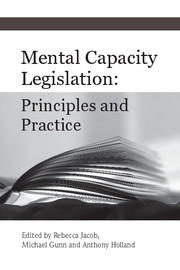5 - The Deprivation of Liberty Safeguards
Published online by Cambridge University Press: 01 January 2018
Summary
In terms of their introduction to the statute book, the Deprivation of Liberty Safeguards (DoLS) were created as an amendment to the Mental Capacity Act 2005 through the vehicle of revision of the Mental Health Act 1983 in 2007. They came into statutory force on 1 April 2009 in England and Wales. The legislation puts in place a procedure through which adults over the age of 18, who are shown to lack capacity to decide on their care and treatment, can be deprived of their liberty in a hospital or care home.
The purpose of the safeguards was to deal with an issue highlighted in litigation by Mr HL that concluded in the European Court of Human Rights. This issue, which became known as the Bournewood gap, concerns the rights of individuals whom it has not been considered necessary to detain under sections 2 or 3 of the MHA, but who are in hospital as informal patients without having consented to such admission.
The essence of Mr HL's claim was that he had been unlawfully detained in hospital without the use of the Mental Health Act (MHA). The counterclaim was that he was an uncomplaining man, who was not capable of making decisions and who was lawfully present in hospital by virtue of section 131 of the MHA, which provides for informal admission, and it was felt that the ‘doctrine of necessity’ justified the treatment and restrictions imposed on him by Bournewood Hospital. The European Court found in favour of Mr HL because it took the view that there was a breach of Article 5 of the European Convention on Human Rights, which is part of English law by virtue of the Human Rights Act 1998 (HL v The United Kingdom, 2004). Article 5(1) provides that: ‘Everyone has the right to liberty and security of the person. No one shall be deprived of his liberty save in the following cases and in accordance with a procedure prescribed by law’. The cases listed include: ‘the lawful detention of persons for the prevention of the spreading of infectious disease, of persons of unsound mind, alcoholics or drug addicts, or vagrants’ [italics added].
- Type
- Chapter
- Information
- Mental Capacity LegislationPrinciples and Practice, pp. 78 - 95Publisher: Royal College of PsychiatristsPrint publication year: 2013

